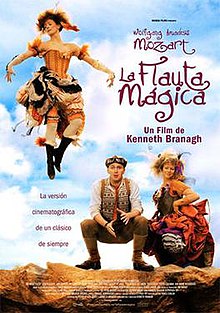The Magic Flute (2006 film)
| The Magic Flute | |
|---|---|

Spanish Poster of The Magic Flute
|
|
| Directed by | Kenneth Branagh |
| Produced by |
Pierre-Olivier Bardet Simon Moseley |
| Written by |
Emanuel Schikaneder (Libretto) Kenneth Branagh (Adapted for the screen by) Stephen Fry (English libretto and dialogue) Kenneth Branagh & Stephen Fry (screenplay) |
| Starring |
Joseph Kaiser Amy Carson René Pape Lyubov Petrova Benjamin Jay Davis Silvia Moi Tom Randle Ben Uttley Teuta Koço Louise Callinan Kim-Marie Woodhouse Rodney Clarke Charne Rochford |
| Music by | Wolfgang Amadeus Mozart (Chamber Orchestra of Europe conducted by James Conlon) |
| Cinematography | Roger Lanser |
| Edited by | Michael Parker |
| Distributed by | Revolver Entertainment Les Films du Losange |
|
Release date
|
September 2006 (Toronto International Film Festival) |
|
Running time
|
133 Mins |
| Country | United Kingdom France |
| Language | English |
| Budget | US$27,000,000 |
The Magic Flute is Kenneth Branagh's English-language film version of Wolfgang Amadeus Mozart's singspiel Die Zauberflöte. The film is a co-production between France & the UK, produced by Idéale Audience and in association with UK's The Peter Moores Foundation.
In November 2005, it was announced that, as part of the 250th anniversary celebration of Mozart's birthday, a new film version of The Magic Flute, set during World War I, was to be made, directed by Kenneth Branagh, with a translation by Stephen Fry. The film was presented at the Toronto International Film Festival on 7 September 2006, at the Venice Film Festival on 8 September of that year, and released in Switzerland on 5 April 2007. It has played in many European countries.
The film, with a soundtrack performed by the Chamber Orchestra of Europe conducted by James Conlon, is the first motion picture version of the opera specifically intended for cinemas. Ingmar Bergman's 1975 film version was made for Swedish television and only later released to theatres. Branagh's version was shot in Super 35 and released in anamorphic widescreen, while Bergman's was filmed in Academy ratio for television sets of the 1970s.
A DVD of the film was released in France in August 2007 with a bonus soundtrack CD (lasting around 79 minutes) and a "Making of" featurette (50 minutes). The film has also been released on DVD in the Netherlands (in a three-disc set), Finland, Argentina, and Japan.
Revolver Entertainment is giving the film a theatrical release in the United States in June 2013, seven years after its premiere in Europe.
The story, which has been updated to a World War I setting, follows the structure of the original opera libretto very closely while stripping away all the Freemasonry references. All of Mozart's music for the opera is retained in the film. Tamino is still sent by the Queen of the Night to rescue her daughter Pamina after Sarastro has apparently kidnapped her, as in the original. His sidekick is still the comical Papageno, a birdcatcher in the original opera, but a man who uses underground pigeons to check for poison gas in the Branagh film. As in the original work, spoken dialogue is interspersed with the arias, duets, and choruses. There are some other updates to the plot mirroring the WW I setting, though, as well as some changes. Tamino is menaced at the beginning, not by a dragon, but by poison gas. The Three Ladies who serve as attendants to the Queen of the Night are turned into hospital nurses and the Queen herself is made more tragic and less purely evil (Upon climbing the wall of Sarastro's dwelling and seeing through the window that Tamino and Pamina have already been married, she commits suicide by deliberately letting herself fall after accidentally losing her footing). Sarastro in this version is a man in charge of a field hospital, not a high priest, and his ultimate wish is world peace, not simply the triumph of good over evil. (He is also Pamina's father, as in the 1975 Ingmar Bergman film version of the opera, and the Queen of the Night is apparently his estranged ex-wife, although this is never directly stated.) Sarastro desperately tries to save the Queen's life before she falls, unlike the character in the original opera, and, just as in the Bergman film, Monostatos commits suicide at the end. Papageno does not wear a feather filled costume as in the original stage work, nor does his sweetheart Papagena, though the pair are frequently accompanied by birds – especially chickens – and their lines are filled with clever bird references. The "water trial" that Tamino must endure occurs when the trench that he and Pamina are in becomes flooded and the trial of fire is a walk through a battlefield in which bombs are constantly exploding.
...
Wikipedia
